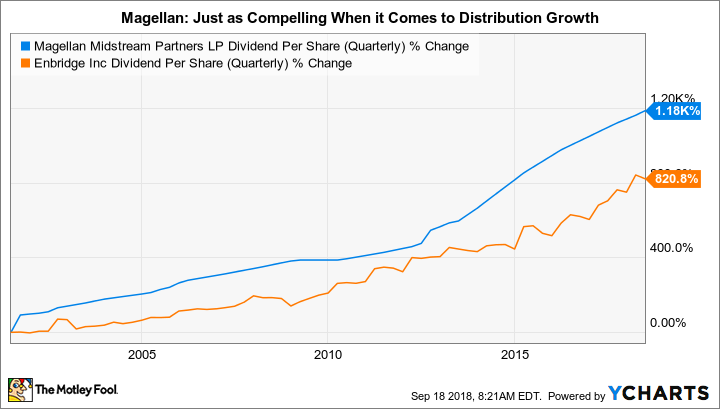Better Buy: Enbridge Inc. vs. Magellan Midstream Partners, L.P.
Enbridge Inc. (NYSE: ENB) has a roughly 6% yield, while Magellan Midstream Partners, L.P. (NYSE: MMP) offers a slightly lower 5.5%. Before simply buying the higher-yielding midstream company, step back and consider the risks at each today. When you do that, the slightly lower yield at Magellan looks a lot more enticing. Here's what you need to know to decide which is the better buy: Enbridge or Magellan.
Moving parts
Enbridge is a nearly $60 billion market cap Canadian energy giant, with a heavy concentration in the midstream sector. Its asset-diversified footprint crisscrosses North America and even reaches across the pond to the United Kingdom (via wind power investments). The company has achieved impressive success, highlighted by a dividend that has increased every year for 22 consecutive years. Annualized dividend growth over the past decade, meanwhile, was an eye-catching 12%.

Image source: Getty Images.
The problem today is that Enbridge is going through some pretty big changes. It has been reshaping its portfolio by selling non-core assets and, perhaps most notable right now, is in the middle of an effort to buy four controlled (but separate) entities, including publicly traded master limited partnerships Enbridge Energy Partners, L.P. and Spectra Energy Partners, LP. It has finally reached an agreement with all of the related companies, having to pay more than it originally offered for some. But now the hard work begins, as Enbridge actually has to consummate all of the deals and integrate the assets into its portfolio.
Even assuming Enbridge succeeds in executing its asset roll-up plan as currently designed, simplifying its corporate structure along the way, it still has to work toward two more of its goals: debt reduction and continued capital investment. These are competing goals, to be sure. Enbridge is working through a complex period of its corporate life today. I think it will do fine over the long term and continue to reward investors with stable and growing dividends. However, investors will need to keep a close eye on what's going on right now. For active investors willing to monitor all of the moving parts here, it will likely turn out to be a fine long-term investment. However, when you compare it to Magellan, the risk/reward trade-off looks less appealing.
Who doesn't like boring?
Magellan is a much smaller entity than Enbridge, with a relatively tiny $15 billion market cap. Its collection of midstream assets are concentrated in the middle and eastern United States, with no direct exposure to Canada or any other country (or other asset types, like renewable power). However, that hasn't stopped the partnership from rewarding unitholders with distribution growth. Magellan has upped its distribution every single quarter since coming public in 2001 (roughly 18 years). Annualized distribution growth over the past decade, meanwhile, comes in at just under 11%. It can stand toe to toe with Enbridge when it comes to distributions, a testament to its long-term success.
MMP Dividend Per Share (Quarterly) data by YCharts.
The big difference is that Magellan has long been one of the most conservative midstream companies around. For example, Magellan's debt to EBITDA, at a modest 3.5 times, is at the low end of the industry and significantly below that of Enbridge. And Magellan recently announced that it would dial back distribution growth a little so that it could ensure distribution coverage of 1.2 times over the next few years. Even with this pullback, though, distributions are expected to grow as much as 8% a year through 2020. That growth is backed by around $2.5 billion worth of expansion projects -- most of which have customers lined up already.
MMP Financial Debt to EBITDA (TTM) data by YCharts.
Magellan is basically working the same playbook it always has: safety first backed by a slow, steady, and kind of boring business approach. And for more conservative investors, the slightly lower yield at Magellan is probably the better risk/reward trade-off here. That's especially true given Magellan's still solid prospects for distribution growth backed by highly predictable investment plans.
Know what you're getting into
There's nothing particularly wrong with Enbridge, Inc. In fact, for more active income investors, it might very well be worth the extra effort to pick up an additional 0.5% yield over Magellan. But you have to be willing to monitor the complex events taking place today. Magellan's more conservative approach, high yield, and well-supported distribution growth prospects, meanwhile, look like a better risk/reward trade-off for most investors, particularly those who are risk-averse or that don't want to spend their time tracking their investments on a daily basis.
More From The Motley Fool
Reuben Gregg Brewer has no position in any of the stocks mentioned. The Motley Fool recommends Enbridge, Magellan Midstream Partners, and Spectra Energy Partners. The Motley Fool has a disclosure policy.

 Yahoo Finance
Yahoo Finance 

